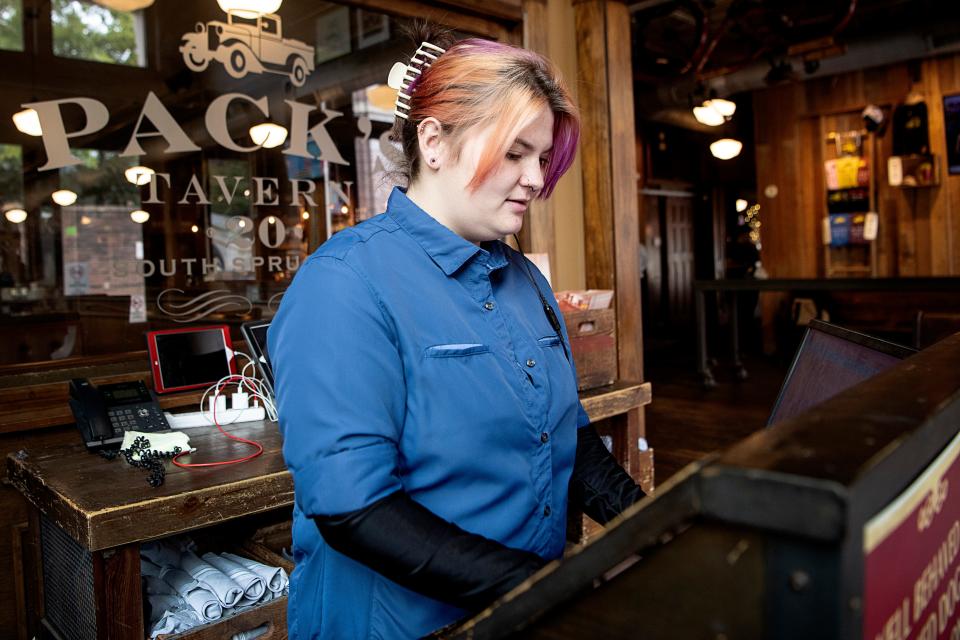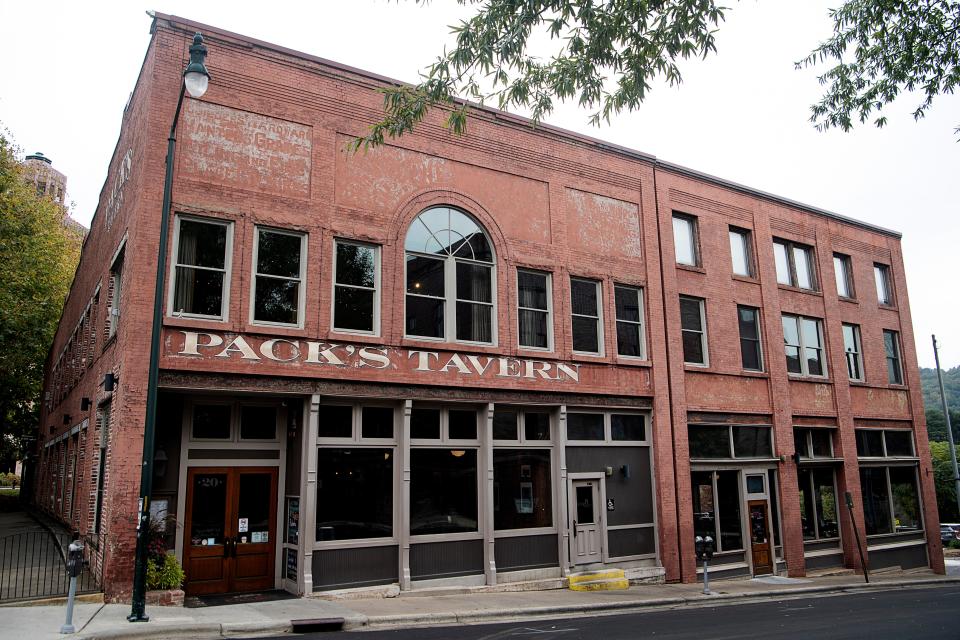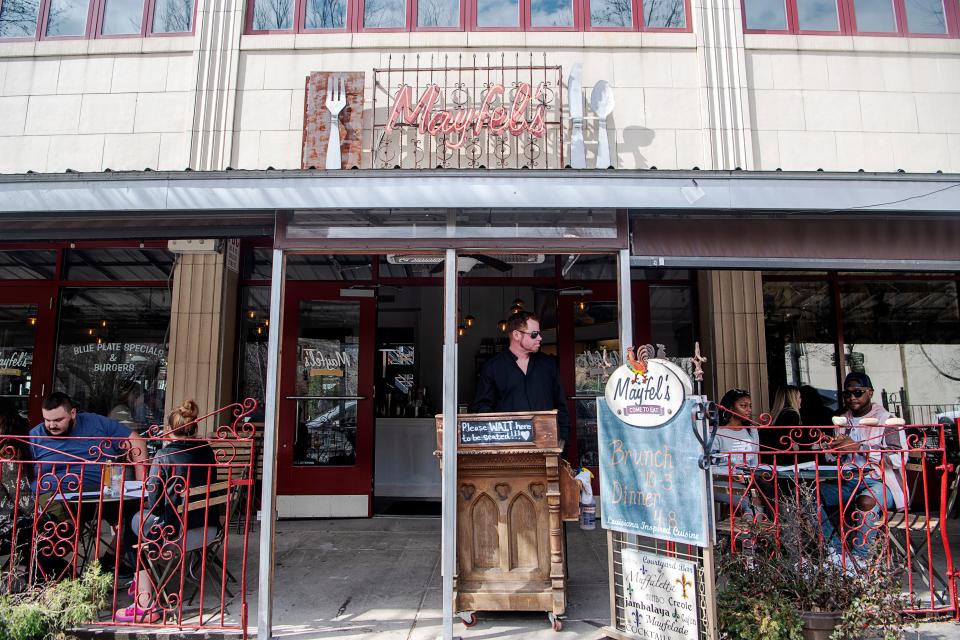Are Asheville restaurants adequately staffed to handle peak fall foliage crowds?
ASHEVILLE - The fall season brings leaf peepers into Asheville from near and far, with their love for nature and hearty appetites.
As the leaves change and fall, area restaurants are filling up with the increased volume of tourists. Finding the staff to manage the uptick of customers proves difficult for some employers while others have learned to adapt to the evolving food and beverage industry.
“We’ve been really lucky. This year will wrap up as our biggest year to date, so business has definitely returned and grown for us,” said Mary Evans, spokesperson for Pack’s Tavern, a popular eatery in downtown's Pack Square.
“We have been fortunate to have kept a really strong staff since the pandemic. We had a lot of our team come back. We have some team members who’ve been with us for the 13 years we’ve been open.”

Pack’s Tavern, which has nearly 100 employees, has a strong front and back of house staff that has allowed the downtown restaurant bar to operate at full capacity seven days a week, she said.
Scott McLean, director of talent management for Biltmore Estate, oversees recruiting, sourcing, hiring selection, and onboarding for an average of 600-800 new employees, annually. Most applicants are from Asheville, but the estate receives inquiries from candidates across the region and country, depending on the role.
In total, about 2,200 employees are working at the estate, with the food and beverage department the largest.
The historic tourist attraction has six restaurants, plus seven walk-up or limited-service food and beverage concepts on the property.
“We, like many other industries and employers here in town, continue to experience a very challenging job market,” McLean said. “It really is a candidates' market right now. They have many choices.”
Peak season trends
Liz Button, chair of the Asheville Independent Restaurant Association, said labor hasn’t been as much of a struggle as during the pandemic, but operations have evolved resulting in some changes to how businesses are staffing their restaurants.
Oct. 1 through New Year’s Eve is the peak season for the local restaurant industry.

The volume of people dining out has increased as the city sees more visitors and new residents, Button said.
In July, another peak time for food and beverage businesses, AIR conducted a survey of its 93 members who represent 145 locations, to learn about their challenges and concerns. The 48 members who responded represent 78 locations.
Overall, July's performance wasn’t as good as expected for members this year, Button said.
October has started better, giving members optimism and excitement, she said.

Express Employment Professionals, a regional staffing agency, sees more companies seeking employees and candidates looking for work opportunities between October and December.
“Our region, as a whole, is seeing more people here, which is exciting,” said owner Meredith Campbell. "For every person leaving, there’s about two people coming in, so that obviously has an impact on the workforce ― who’s available to work, who wants to work, what their skills are."
More: More people are moving to Asheville than leaving; what's driving the influx?
Higher wages vs. rising cost of living
Many of today’s labor challenges may be attributed to the COVID-19 pandemic, McLean said.
“With inflation … the positive thing that happened with COVID is the hospitality leisure industry wages went way up comparably to other companies,” Button said.
However, protests calling for fair wages, benefits, improved treatment and other workers' rights continue locally and across the country.
Still, housing and the overall cost of living plague many Asheville residents, pushing some food and beverage workers out of the city.
Button said that 74% of AIR members surveyed said they were grappling with housing costs and 61% with housing availability.

In response, some employers have increased wages and improved benefits to attract candidates and retain workers. However, it’s not always enough.
Just Economics of WNC, a live wage advocacy group, reported that a person would have to make at least $20.10 an hour ― or $41,800 annually ― to afford to live in Buncombe County in 2023. That’s a 14% increase from the $17.70 an hour living wage rate set in 2022.
Pack’s Tavern, a locally owned and operated business, increased wages to stay competitive and with acknowledgment of the higher cost of living.
“Early on, we recognized in order to keep good people, we were going to have to pay good people,” Evans said. “Our wages are among the highest in Asheville, especially for our kitchen staff, and because the restaurant is successful and has good sales, then the front-of-house servers are able to make a decent wage.”
The base pay for a line cook at Pack’s Tavern is $22 an hour. And the restaurant offers a retention bonus after six months of employment, Evans said. Benefits, health insurance and vacation time are offered to full-time employees, too.

Biltmore’s starting wage is $16 and higher based on the position and experience.
Campbell, of Express Employment Professionals, said increased wages were needed in Western North Carolina, but it’s not a viable solution.
“I don’t think small businesses ― I’m one myself ― can continue to do that and still have a sustainable business. We can’t just keep throwing money to attract people,” Campbell said. “It is expensive to live here, so there’s an immediate gut-reaction thought to say, ‘We’ll pay people more,’ but Asheville is majority small businesses, so they don’t have the bandwidth, the support, the sustainability to say, ‘I’ll just pay you $4 more an hour.’”
More: Crow & Quill, Green Sage may be the beginning of local service industry union movement
Shifting industries
Another concern is both keeping and gaining new talent in the food and beverage industry.
Food and beverage workers have recognized their transferable skills and set different standards for themselves, like higher wages, different schedules, better treatment, and an environment change to an office or different customer service style, she said.

Express Employment Professionals matches job candidates of various skill levels to employers in various industries across WNC. The staffing agency doesn’t work with restaurants but has noticed an increase in former food and beverage workers interested in entering other industries.
Many local employers are seeking food and beverage workers to recruit to their industries, Campbell said.
“They can think on their feet, they have good customer service, they move quickly,” Campbell said.
Working to live
Employers have noticed a shift in what candidates require to accept a job offer.
Following the pandemic, job seekers have different expectations about what they want for a job, putting work-life balance as a priority, Campbell said.
“They’re less likely to give that up now than before for how they experienced the pandemic, how they made ends meet but having some kind of ‘I don’t live to work, but I work to live’ has been a very tangible workplace/marketplace reaction,” Campbell said.
The labor market and candidate expectations continue to evolve often and quickly, said Biltmore Estate's McLean. Trends he’s seen at the estate are trends that existed before the pandemic but have accelerated since.
More candidates are requesting schedule flexibility and resources to support their lifestyles.
“One piece of feedback that we hear frequently from candidates is desiring the sense of purpose and meaning in the work that they do,” McLean said. “We’re three to four years into the pandemic era at this point, and it is remarkable how the market candidate expectation and the general sense of what candidates are looking for and the work that they want to do is rapidly changing.”
Restaurants continue to open in the Asheville area, which adds to the competitive market.
“Asheville has a lot of restaurants, and everybody is hiring and looking for people. That in and of itself makes it challenging,” Evans said.
Stories you may have missed:
Tiana Kennell is the food and dining reporter for the Asheville Citizen Times, part of the USA Today Network. Email her at tkennell@citizentimes.com or follow her on Instagram @PrincessOfPage. Please support this type of journalism with a subscription to the Citizen Times.
This article originally appeared on Asheville Citizen Times: Asheville restaurant industry manages shifts in evolving labor force

